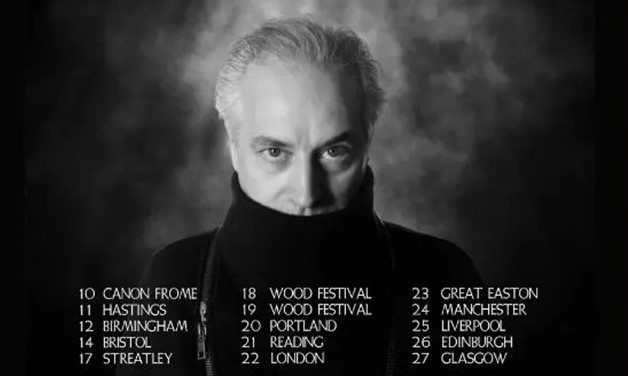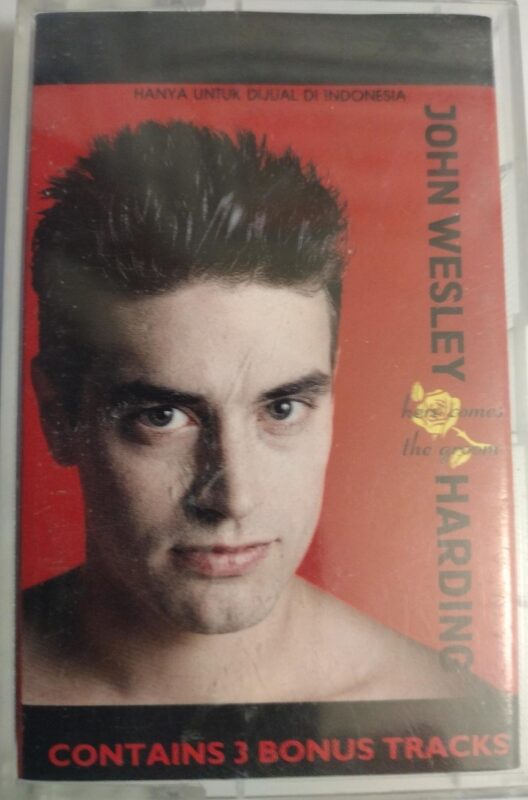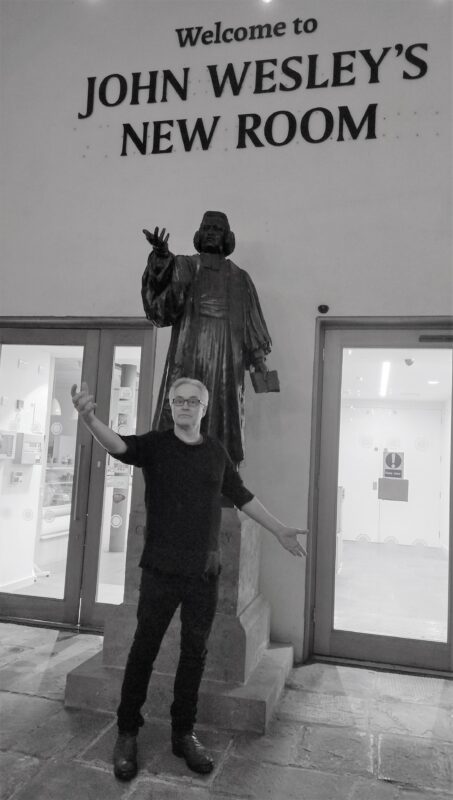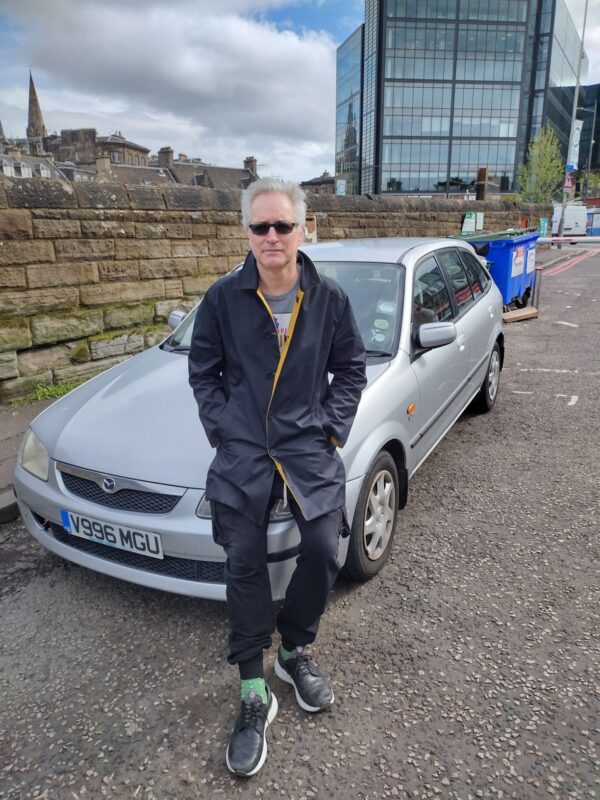
In May 2024, I spent two and half weeks with one of my favourite singer-songwriters, Wesley Stace (aka John Wesley Harding), on his first UK tour for some time. These two articles provide some insights into how the tour came about, matters of transport and finance, as well as the gigs. It might prove useful to anybody considering undertaking a similar venture. This first piece covers how the tour came about and was arranged with promoters, the venues plus how the “tour bus” fared.
How it happened
Just over 30 years ago I was working on the island of Lombok in Indonesia. Back then, an era before music became free, cassettes were expensive. However, in Indonesia quasi-legal cassette versions of major labels’ albums, complete with inlay cards, sold for a tenth of the price of their European equivalents. My weekly visit to the local cassette emporium not only allowed me to purchase the complete works of artists such as Van Morrison and Neil Young, but also to acquaint myself with new ones, safe in the knowledge that each album only cost £1. One Friday, the red spine of a cassette box entitled ‘Here Comes the Groom’ caught my eye. It turned out to be the first studio recording by a young chap using the moniker John Wesley Harding, a stage name adopted by the singer-songwriter Wesley Stace. It became a firm favourite on the tape deck of my Toyota Landcruiser whilst driving around the irrigation schemes of Lombok.

In 1993, I returned to the UK just in time for a rare appearance of John Wesley Harding, or Wes as he is known, at Camden Dingwalls. Having been signed to Sire in the US by Seymour Stein in 1989, Wes has spent the past 34 years in the United States. He’s become one of my favourite songwriters and live performers, thanks to his great songs, stage craft and razor-sharp wit. British gigs have always been very erratic, generally coinciding with visits to his family in Hastings.
Around 20 years ago, having spotted his email address on an album sleeve, I sent Wes a message which, to my astonishment, he responded to immediately. In November 2016, after many years of my pestering, Wes came to play an invitation only gig for some of my friends and his fans in the upstairs room of a pub in Reading where I live. The gig was a success and Wes seemed to have enjoyed it, despite my rambling introduction which was longer than this article.
After 2016, we corresponded about a potential UK tour, nothing big, maybe five or six dates. In 2019, after contacting various promoters, six gigs had been firmed up for September of that year. Unfortunately, in May, Wes’s mother, Molly Townson, died suddenly and the tour was cancelled. The tour was rearranged for September 2020, but with the COVID-19 shutdown that also had to be abandoned. A few years went by and in September 2023 I suggested to Wes that we try to organise a something for May 2024. I thought it should be called the “Third time lucky tour” but Wes’s idea of “May or may not” seemed better. A slot in mid-May 2024 was set aside and I began to organise what turned out to be a 15 date jaunt and Wes’s first tour of the UK for 15 years.
The promotors
Arranging tours requires a certain amount of tenacity and perseverance coupled with a little marketing nous. Emails were sent to various promoters and venues, and I waited. Over the next three months I started to fill in any blank dates because Wes had indicated he wanted to play as many gigs as possible. The promoters, even the professionals, were all music enthusiasts. Pillars of the community, such as Mark Howson in Great Easton, Alan Hendry in Glasgow and Jonathan Clifton in Goring & Streatley spend a lot of their spare time arranging gigs without ever considering taking any payment for their work. When speaking to George of Cow Muck Promotions, who puts on concerts in West Oxfordshire, about how the finances for the gig would work he said, “You know it’s financial suicide for me, Darren! People pay for their tickets and then I give all the takings to the artist, how does that sound to you?” I suggested that it seemed a very generous deal, especially as he told me that his sister, who lived next door to the venue, would feed us before the gig. Although like Led Zeppelin’s infamous manager, Peter Grant, I was born and brought up in a south London suburb I didn’t have Grant’s experience as a bouncer and wrestler. Fortunately these skills weren’t required when dealing with 21st century promotors who were, almost without exception, honourable.
The venues
The venues ranged from a community farm, a barn, churches, art centres, cafes, back rooms of pubs to the sofa in Mark Whitfield’s, (editor of Americana UK), front room. Most of the places had a capacity of about 50 which was perfect. One of the venues was a nominative gig in that it was held in John Wesley’s New Room in Bristol. Built in 1739, it is the oldest Methodist building in the world and became the cradle of the worldwide Methodist movement. It’s a beautiful place. Unfortunately, a poster exclaiming that John Wesley Harding was playing John Wesley’s New Rooms was never produced but I did manage to get a photo of Wes posing with a statue of the great man, well actually it’s his brother Charles.

The 13th century Saint Nicholas church was another memorable venue. Situated in the village of Baulking in West Oxfordshire, which has a population of 80, it proved to have wonderful acoustics coupled with a charming interior and it drew an audience of 75. The upstairs room at the Waverley Bar in Edinburgh has seen Billy Connolly, The Clancy Brothers, The Corries, Gerry Rafferty, The Dubliners and Barbara Dickson, to mention just a few, cut their teeth there. Despite attracting the smallest audience of the tour it felt homely and cosy: ideal. In fact all the venues were great in different ways and added to the homespun feel of the trip.
The transport
In the hierarchy of modes of transport, I place the automobile only just above the aeroplane at the bottom of my preferences. My mother, knowing my antipathy towards the car, bought me some driving lessons for my 17th birthday, knowing full well that if she hadn’t I’d never learn. Much to my surprise I passed my driving test first time, well before I turned 18. However, I then didn’t get behind the wheel of car for another 10 years and that was in Indonesia, where driving is a very different experience to the UK, if you haven’t used the horn for 30 seconds, you’re doing something wrong.
I didn’t actually own a car until I was 36 and that was a second hand, diesel Peugeot 106, which handled like a tractor and didn’t go much faster. I’m now on my second car which is a 25 year old Mazda 323. It’s a 1.1 litre automatic. You don’t have to be a petrol head to understand what its acceleration is like, think snail or sloth. Over the past 20 years I’ve spent considerably more on bicycles than motorised vehicles, which is how I think the world should be.

I only drive about 2,000 miles a year and rarely more than 20 miles in one go. When mentioning the tour to a colleague he said, “Why would someone who’s played with Bruce Springsteen want to get in your shitty little car to travel round the UK for two weeks?” He had a point but hiring a more luxurious, or indeed any vehicle, would have put a significant dent in the tour budget. So the Mazda 323 it was.
The car made it from Portland in Dorset to Glasgow and many points in between, covering around 2,500 miles and to quote Wes “we didn’t crash”, although there was an incident with a hedge in South Oxfordshire, thanks to my dodgy reversing skills. Maybe for the next tour I’ll have upgraded to something more modern, but the Mazda’s just passed its MOT and is about to start its 26th year on the road. It’s only another 14 years until it’ll be classed as a “classic car” by the UK authorities and becomes tax exempt. When I told this to the mechanic at the garage, he raised an eyebrow and said “It’ll have rusted away by then mate!” Let’s see. Given the frequency of Wes’s UK tours I’m predicting that the next one will take place in 15 years time in a 40 year old, silver Mazda. Watch this space!



Looking forward to part 2! Always wanted to understand how such tours worked.